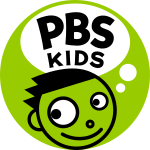Miss Lori and Hooper

Logo (2013-present)
|
|
| Owner | PBS |
|---|---|
| Country | United States |
| Introduced |
July 11, 1994 (as PTV Park) September 6, 1999 (as PBS Kids) |
| Website | pbskids |
| Type | Digital broadcast TV network (children's programming) |
|---|---|
| Country | United States |
| Availability | Nationwide (via OTA digital television) |
| Founded | February 23, 2016 |
| Headquarters | Arlington, Virginia |
|
Broadcast area
|
United States |
| Owner | Public Broadcasting Service |
|
Launch date
|
January 16, 2017 |
| Affiliates | List of affiliates |
|
Official website
|
pbskids |
PBS Kids is the brand for most of the children's programming aired by the Public Broadcasting Service (PBS) in the United States. Some public television children's programs not produced by PBS member stations or transmitted by PBS which is produced by independent public television distributors such as American Public Television are not labeled as "PBS Kids" programming, and it is mainly a programming block branding.
PBS Kids is also the name of a separate network which has had two iterations in the age of digital television; one which existed between 1999 and 2005, and the current version which was launched in January 2017.
The framework for PBS Kids was established as part of PBS's "Ready to Learn" initiative, a project intended to facilitate access of early childhood educational programming to underprivileged children. On July 11, 1994, PBS repackaged their existing children's educational programming as a new block called "PTV". In addition to scheduled educational programming, PTV also incorporated interstitial content such as "The P-Pals", which featured animated characters shaped like PBS logos delivering educational content from their fictional world, "PTV Park". These interstitial shorts were aimed at younger children. Older children were targeted with live action and music video interstitials.
On September 6, 1999, PBS launched the PBS Kids brand in several areas including its daytime Ready to Learn Service, PBS Online web pages for kids, and a home video label. Children's programming on the PBS network was then given unified branding. Along with the block of programming on PBS, PBS Kids lent its name to a separate television network, which launched on the same date and was targeted to children from 4 to 7 years old. The PBS Kids Channel ran for six years.
On September 30, 2000, the Bookworm Bunch programming block was introduced as PBS Kids' Saturday morning block.PBS Kids Go!, a programming block targeting older children, was launched in October 2004.
The network was shut down on September 26, 2005, in favor of a new commercial cable and satellite joint venture channel, PBS Kids Sprout, which was developed in partnership with two producers and Comcast (who later bought full control of the network via NBCUniversal). PBS gave licensees an option to sign on Sprout promoters while most of the other half programmed their own children's channel. PBS offered a replacement early school-aged kids network based on the block PBS Kids Go! by April 2006 to be launched in October 2006, but was cancelled before launch.
...
Wikipedia
